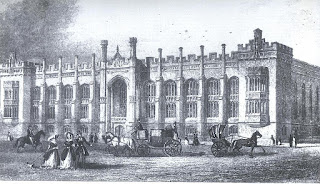A man who got into a row with a friend who he believed owed him money was stabbed with a pair of scissors, but the killer was given a lenient sentence after the jury recommended mercy.
One evening in early June 1933 Clarence Collingwood, a 24 year old hairdresser, went on a heavy drinking session with labourer William Colduck, aged 46. They began arguing over half a crown (12.5p), which Colduck said that he had loaned to Collingwood, who took him back to his lodgings in Islington.
Whilst there the pair had a scuffle and Colduck ran off. When he got to his home in Everton Road he noticed that he was bleeding from the armpit and sought treatment. Nearly three weeks later he died of blood poisoning and during the post mortem, the point of a scissor blade was extracted from the shoulder bone.
Collingwood was arrested and charged with murder, saying 'I am not guilty' when he appeared before the police court on 28th June. He appeared at the Manchester assizes on 11th July where the murder charge was not pursued. During a trial for the lesser charge of manslaughter Collingwood claimed he had acted in self defence and although he was found guilty with a recommendation for mercy by the jury. He was then sentenced to six months imprisonment.





























